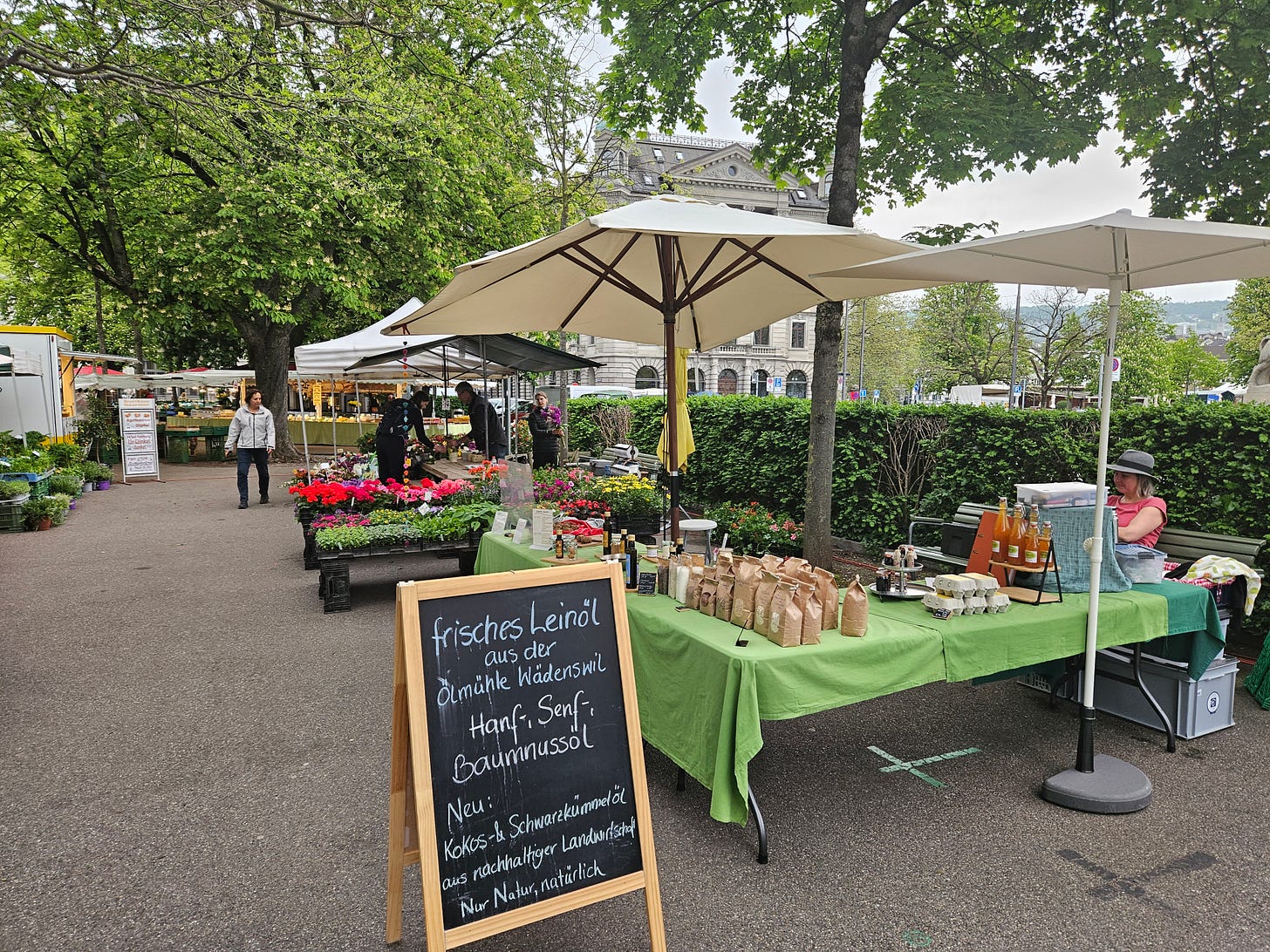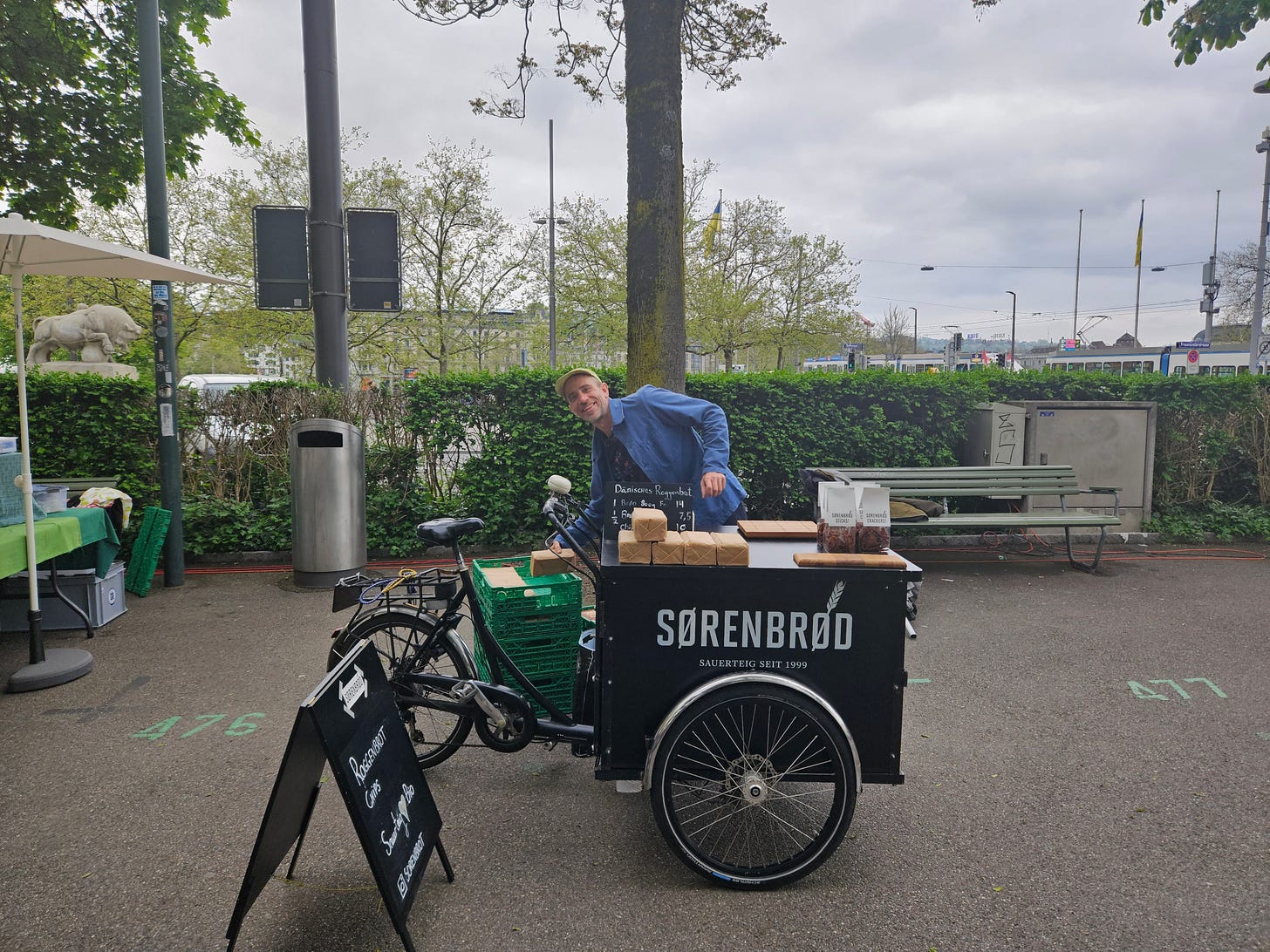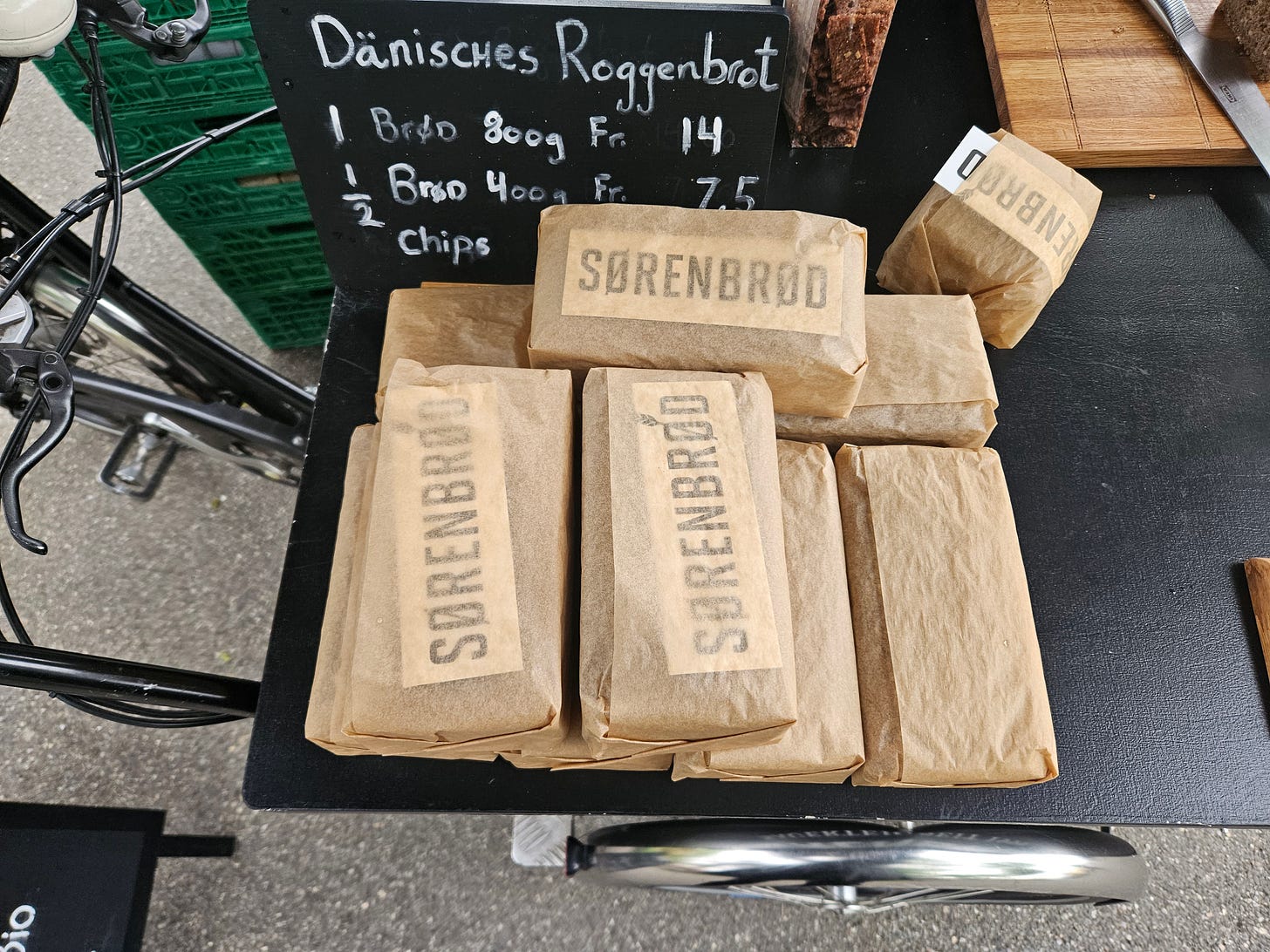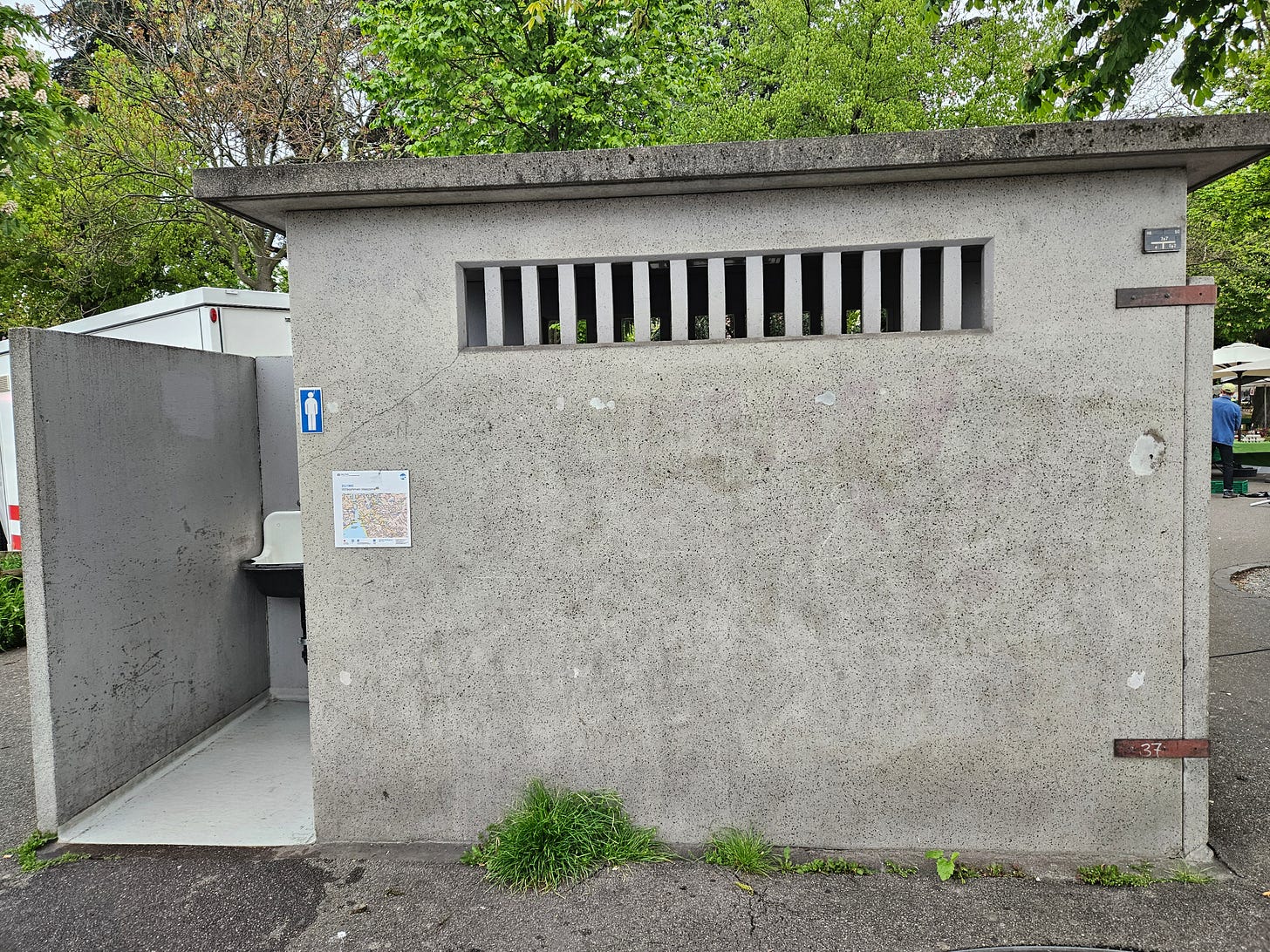The Secret Culinary Community of Danes in Switzerland – part one
I discover a small community of Danes in Switzerland's largest city, shaking up the local culinary scene
Last month on a work trip to Zurich, a message arrived from a friend of a friend attaching a pin on google maps. On inspection, the pin pierces a spot on the map that says “pissoir”, the French word for urinal. The message says to meet the next morning at 7 am.
This all sounds like a set of instructions for a hostage exchange, or Cold War brush contact, but the truth is less dangerous and far more fun. I am meeting a Danish performance artist, to talk about sourdough, at an early morning market that has been taking place in the same spot for over 100 years.
The weather in Zurich had been atrocious over the previous two days – thunderstorms, rain, fog and heavy grey skies. Walking along the river Limmat towards Lake Zurich at six thirty in the morning, it seemed slightly better. There was a handful of earnest runners, pounding the pavements. I saw the occasional dog walker, but the streets were fairly empty, and for the first time that trip, the spires, towers and roofs of the Altstadt began to gleam in the early morning light. A bicycle towing a small black cart lumbered past on my left side. “I bet that’s him” I thought to myself as I watched the cyclist cross the river and head towards the main road.
Artist Søren Berner has invited me to Bürkliplatz market, where he sells his homemade sourdough rye bread every Tuesday morning. There is a pissoir, right at the entrance to a small park, shaded by trees that has been the site of a public market for over a century. One side of the park is fragrant with the scent of cut flowers. There’s a van selling delicious Turkish pastries and a series of stalls displaying fresh local produce – white asparagus, artisan oil, jars of homemade pasta sauce and pesto, herbs, fruit and vegetables
Berner’s small black bicycle cart doubles as his stall; a parasol that he slings alongside shelters his product from the elements. “I thought I passed you on the way here he says” and I admit that I spotted him too.
Berner is a performance artist, who started making sourdough while at art college in Amsterdam in 1999. “I started baking because the bread in Amsterdam is dreadful – yes, you can absolutely say that! It is truly awful, so I needed to make my own. I used a recipe for rye bread from my grandmother,” he says.
As a performance artist, Berner’s work doesn’t take up physical space in a gallery or an exhibition hall – or if it does, it is only present for a fixed time, before it disappears. “This all started at an exhibition in Bern at Progr.” explains Berner. “They invited artists working with food, so I built up a rye bread station, where you could come and grind the grains. There was an oven, a recipe and I brought my sourdough mother (the soudough starter) with me. Visitors came over a period of time – on the first day to make the dough, on the second day to make the second part of the dough. It was a success”
His neighbours started asking him to bake for them, then people at his daughter’s school and then an organic shop near their home. At the time, Berner was using his own oven, which could only fit six loaves. He spoke to the restaurant on the ground floor of his apartment building and they agreed to let him bake there on Mondays, when they were closed. He then moved operations to a nearby bakery and now produces 100 loaves a week, which he sells at market and delivers to a number of organic stores and restaurants around the city, by bicycle.
Berner sources the rye from a farm in Emmental and uses a balance of linseed and sunflower seeds along with some local organic beer for extra richness. “I have been perfecting the recipe over the last years and now it turns out pretty much the same each time. The weather makes a huge difference in baking, even though the bakery tries to keep the temperature and humidity in balance, it still has an effect.
It takes three days to make one of Berner’s loaves - one of the reasons he believes commercial, large-production bakers are not as keen to take on the task, when a yeast-based loaf can be ready in a matter of hours. “On Sunday I make the pre-dough – that’s basically sourdough, rye, water and salt. It stands for 24 hours – you leave it and let it do its work. Then the second day I mix in linseeds, wholegrains, beer and sunflower seeds, put it in the tins and leave for 6 to 8 hours. Then it goes into the oven for more than 2 hours. Then, when you take it out it needs to cool very slowly - for over 12 hours in a moist environment - otherwise it will get as hard as a stone. And then we wrap it to keep the moisture in. On Tuesday morning, it’s ready”.
Berner has cut thin slices of his bread and placed them on a board for passers by to try. I taste a square and am surprised by how soft and yielding it is. It has a delicate rye flavour, a faint sweetness and richness from the added seeds. It’s an odd word to use, I suppose, but I find the best way to describe it is “juicy”
“The bread is really fresh and moist now, and the loaf will last for ten days” explains Berner “It will slowly get harder and harder but for ten days no problem. It never gets mouldy either. With a wheat bread – tomorrow you can hammer in a nail with it.”.
He doesn’t even mention sustainability, when discussing his business - it is instinctive for him. The bicycle for deliveries, the organic local ingredients, a loaf that lasts a long time with no waste – sustainability just happens. When I ask him about it, he has a quick reply “Our whole society needs to become more sustainable. You just have to look a little bit in the past and see how a lot of things work. Before we had yeast, sourdough was the only way to make bread”
We talk about the importance of bread as a symbol in society, how egalitarian it is, how a topping can elevate a simple slice of rye into a fancy smorrebrod, or create a filling meal for a small price. Berner explains how breadmaking feeds into his career in performance art; how neatly it has fitted in to his life and aligned with his values as an artist.
“Now I have something that takes some physical space, but it also disappears again. It’s a sculpture, it’s edible art that is here and its participatory. In my career I have always been working in between the exhibition space and the public space. The organic shops I sell the bread to, perform as my galleries, they exhibit my work and sell it. As an artwork it plays with the definition of art itself – what is art?
I’m intrigued by the religious association of bread. As a child with a strict Catholic upbringing, I became obsessed with transubstantiation, convincing myself that if I bit into the Eucharistic host, blood would come gushing out, rather like a religious locket lozenge. And then there is yeast, the very symbol of resurrection – a dormant substance that can spring to life and bring life to lifeless ingredients. Berner thinks his sourdough could be seen as a symbol of eternity. “I’ve been using the same starter since 1999” he says. “That’s over 24 years. I could keep it going and pass it on to someone after my death. Technically, the sourdough could live on after me, like a soul. It’s very spiritual”.
Read more about the bread here
Follow him on insta @sorenbrot








